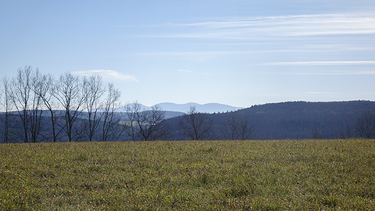Albany County must take the long view, saving a natural wonder for the good of its citizens now and forever
We remember the first time we visited Switzkill Farm in Berne. That was two decades ago when it was about to become a Buddhist center.
We were struck, as anyone would be, by the natural beauty of the place. It wasn’t just the stunning views of the Catskills — the purple mountain majesties that Katherine Lee Bates immortalized in words to celebrate America.
There was beauty, too, in the open fields, in the running stream, in the pond with minnows frequented by geese, in the variegated woodland and stands of soldier-straight trees.
So the words spoken then by Judith Brown, the manager of the Rigpa project — “Rigpa” is the Tibetan word meaning “the innermost nature of mind” — made sense to us.
The traditional Buddhist organization, which had centers in Ireland and France, had scoured the northeastern United States, looking for its first location on this continent — and ended up choosing the 350-acre property then owned by The New School in New York City.
In addition to instruction on meditation and the philosophies of Buddhism, the center was to be a place to train caregivers, especially those helping dying people. Brown said then that the environment was important in selecting the site.
“We tend to be environmentally conscious people,” she said.
Whether we are Buddhists or not, we believe there is something in the human spirit that is enriched by the natural beauty of a place like Switzkill Farm.
That natural beauty predated the Buddhists’ arrival in Berne and continued after they left.
In 2014, the Berne Town Board made a sudden decision to purchase the property. As Kevin Crosier, who was supervisor at the time, told it then: When a representative of the Open Space Institute came to the site for the first time and took in the view from its highest point, his only question was, “How much do you need?”
The property’s purchase price was $475,000, but cost the town only $142,700, including a $12,500 fee for the easement. The rest of the money was provided by the Open Space Institute and the Albany County Capital Resource Corporation. A conservation easement overseen by the Mohawk Hudson Land Conservancy protects the property from development.
We could see why some Berne residents raised objections over the suddenness of the decision; even some of the board members — all Democrats at that time — expressed reservations because of the haste. Crosier said, without a swift decision, the funding could have been lost.
The initial excitement was palpable in town as a committee was formed to spearhead plans for the property’s use.
The group, working with Overit Marketing Agency, had passionate debates on a name for the property. Ultimately, they pulled from its history as a pheasant farm in choosing the name for the property off of Game Farm Road: Switzkill Farm.
The Berne Town Board then reached consensus on a theme for marketing the property: “Escape to the Helderbergs.”
The plan was to expand educational and recreational opportunities for Berne residents as well as bringing in outsiders, which would help the local economy. In 2015, Crosier estimated that Switzkill Farm brought in about $5,000 that year.
It was thought that the main source of revenue would be rental of the lodge for weddings, meetings, and conferences and from guest-room rentals in the former retreat house. User-recreational fees for activities like cross-country skiing on the trails — discounted for residents — was also anticipated as a source of income.
We covered festivals there in every season, a Trackfest where dachshund-owning members of the United Blood Trackers convened to sharpen their skills on finding wounded game, training sessions by nurses on life-saving skills, Bioblitzes where myriad plants were identified, science classes for school children, bird watchers and flower planters, snowshoers and star-gazers, and Earth Day celebrations.
But, as our Hilltown reporter, Noah Zweifel, wrote last week in a detailed recent history of Switzkill Farm, once Republicans gained control of the town board, Switzkill Farm became terra non grata.
On New Year’s Day in 2020, as the GOP took control of the town board and made sweeping changes, it named no liaison and made no appointments to the Switzkill Farm Board or to the town’s conservation board.
Attempts by Republican-controlled town boards to sell the land privately then faltered because laws around municipal parkland would have significantly complicated the process. And a lawsuit brought by convicted former Supreme Court Justice and current Conservative Party chairman Tom Spargo along with two other residents was dropped.
More recently, the town had proposed a logging operation there.
Albany County originally proffered buying the property in March of 2022, but pulled back the offer late last year after the county realized how poorly Switzkill Farm had been maintained. Earlier this year, The Enterprise reported that one of the several buildings on the property had collapsed.
Despite this, the town rebuffed the county’s follow-up offer to invest county money in maintaining the remaining buildings, with the idea being that the county would eventually revisit the idea of buying it outright.
This was a confounding revelation, not only because the Berne Town Board never mentioned to residents that the county had made this offer, but because the Republican-backed town boards and their supporters have complained that the property costs too much money to maintain.
As recently as September, Deputy Supervisor Anita Clayton had said Switzkill Farm would remain in the town’s possession.
Then, on Nov. 16, Albany County Legislature’s finance committee approved the purchase of the property for $150,000. When we received this good news from Guilderland legislator Mark Grimm, a finance committee member, Zweifel confirmed it with County Executive Daniel McCoy.
“We need to really get in there and start stabilizing it better to protect what’s there now,” McCoy said. This was music to our ears.
On Dec. 4, the full legislature is scheduled to vote on the acquisition. We urge our legislators to vote in favor.
The $150,000 will more than cover Berne’s original expenditure and will help the town, which has spent down its rainy-day funds in recent years, saddling residences with an over 700-percent tax increase in 2024.
It will allow the buildings that are still standing at Switzkill Farm to be preserved and maintained so the uses originally envisioned by the town for the property could yet give a much-needed boost to the local economy.
But the purchase is not good just for the town of Berne and the Hilltown economy but for all the residents of Albany County who will be able to use this gem of a property — hiking there in the spring, summer, and fall, and skiing or snowshoeing there in the winter.
As the Buddhists knew when they chose this piece of land, there is something uplifting in communing with nature.
Reconnecting people with nature can provide cost-effective solutions to the growing burden of non-communicable diseases, including mental-health problems, according to a 2022 survey of studies on the topic, published in The Journal of Global Health and posted by the National Institutes of Health.
Mental-health outcomes improved with connection to nature across 98 percent of studies while physical health outcomes showed improvement across 83 percent. This is important as 10 percent of the global population lives with a diagnosed mental-health disorder, leading to negative health and economic impacts for both individuals and the broader society, the Global Health review says.
“Nature can generate many positive emotions, such as calmness, joy, and creativity and can facilitate concentration … Nature connectedness is also associated with lower levels of poor mental health, particularly lower depression and anxiety,” says another study, which also stresses “high-quality nature spaces” — certainly Switzkill Farm would qualify — “are most likely to help support good mental health.”
In 2021, the Mohawk Hudson Land Conservancy started running a Nature Bus to bring city residents from Albany out to some of its preserves so urban dwellers could immerse themselves in nature.
The Japanese call walking in the woods “forest bathing” and researchers there believe aerosols from the forests, inhaled during a walk, are behind elevated levels of Natural Killer or NK cells in the immune system, which fight tumors and infections.
Studies show that the effects of nature may go deeper than providing a sense of well-being, but also help to reduce crime and aggression. A 2015 study of 2,000 people in the United Kingdom found that more exposure to nature translated into more community cohesion and substantially lower crime rates.
A Yale report on ecopsychology says studies have shown that time spent in nature can lower blood pressure and stress hormone levels, reduce nervous-system arousal, enhance immune-system function, increase self-esteem, reduce anxiety, and improve mood.
Attention Deficit Disorder and aggression lessen in natural environments, which also help speed the rate of healing, it says. In a recent study, psychiatric unit researchers found that being in nature reduced feelings of isolation, promoted calm, and lifted mood among patients.
In an era with growing concerns about the effects of technology, a growing body of research has “led to a tipping point,” the Yale study says, “at which health experts, researchers, and government officials are now proposing widespread changes aimed at bringing nature into people’s everyday lives.”
In a recent paper, 26 authors laid out a framework to create a formal role for the positive impacts nature has on mental health. The Albany County Legislature on Dec. 4 has the perfect opportunity — for the bargain price of $150,000 — to provide that resource for its residents.
Taking an even wider view, we can see the preservation of these 350 acres is good for the environment as a whole. Like the Buddhists, we all need to be “environmentally conscious people.”
In this era of climate change, the Mohawk Hudson Land Conservancy is working hard to protect a large enough swath of land — patching together many individual pieces — to give threatened species a chance at survival.
We are all aware of the disasters exacerbated by human use of fossil fuels — from droughts and fires to floods and famines — and a conserved Switzkill Farm acts as a carbon sink, pulling earth-warming carbon-dioxide from the atmosphere.
The survival of humankind depends on the preservation of our Earth.



